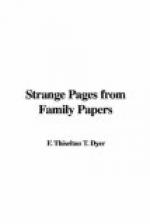The house was searched from garret to cellar without any discovery being made, and Mrs. Abingdon, feigning to be angry with the searchers, shut herself up in her bedroom day and night, eating and drinking there, by which means through the secret tube she fed Father Garnet and another Jesuit father. But after a protracted search of ten days, these two men surrendered themselves, pressed, it is said, “for the need of air rather than food, for marmalade and other sweetmeats were found in their den, and they had warm and nutritive drinks passed to them by the reed through the chimney,” as already described. This historic mansion, it may be added, on account of its elevated position, was capitally adapted as a place of concealment, for “it afforded the means of keeping a watchful look-out for the approach of the emissaries of the law, or of persons by whom it might have been dangerous for any skulking priest to be seen, supposing his reverence to have gone forth for an hour to take the air.”
Another important instance of a strange room is that existing at Ingatestone Hall, in Essex, which was, in years gone by, a summer residence belonging to the Abbey of Barking. It came with the estate into possession of the family of Petre in the reign of Henry VIII., and continued to be occupied as their family seat until the latter half of the last century. In the south-east corner of a small room attached to what was probably the host’s bedroom, there was discovered some years ago a mysterious hiding




